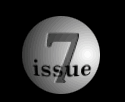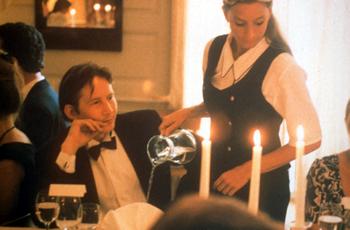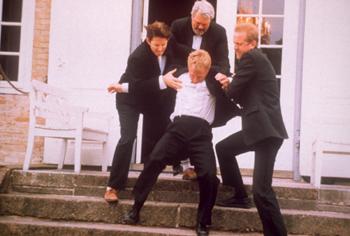





|
|
What distinguishes The Celebration from other films about family behavior is that it focuses its watchful eye on the dusty corners of family life. There, it finds a treasure chest of nervous laughs, pursed lips, and shifting eyes, which say more about the family than all of the speeches, toasts, and small talk combined. The family in The Celebration is a wealthy Danish clan that congregates one summer evening in a country home so big that its bedrooms are numbered. They socialize in the sprawling ballroom, and later dine in the expansive dining room. But since Vinterberg is more interested in corners than in wide-open spaces, he intentionally betrays the grandiosity of these scenes with an intrusive intimacy. His camera catches the tail ends of glances and smiles, appending a critical question mark on each. And by placing the camera at intrusive but detached angles, he can question the authenticity of the simplest of gestures without piercing its surface.
Only behind closed doors do the family members allow their ugly personalities to messily gush forth. But the camera (or should I say house) is still there to watch it all -- recording snippets of action like a surveillance camera. Michael, the youngest son, quarrels with his wife when he can't find his dress shoes, and then has vicious make-up sex with her. In another room, Helene, his sister, engages the butler in a game with the ghost of her recently deceased sister. And in his room, the eldest son, Christian, tries to stay awake as his maid attempts to seduce him. The way Vinterberg pieces the random shards together unifies the siblings' dysfunctionalities into a collective, pulsating neurosis. It suggests that the rooms are whispering amongst each other, smirking, and comparing the notes that they've taken.
The Celebration is a rare film whose technical mastery equals its narrative virtuosity. We can appreciate it for its visual style alone. Or we can admire it as a character study. Or perhaps we can praise it for both because the insinuating camera is our gateway to understanding this sad, self-deluded family. While it never rips the lid off of their aristocratic decorum, it gets close enough to the subtleties of their faces and bodies that we can hear their emotions churning noisily inside them. When a shocking accusation is made across the dinner table, Vinterberg appears to have abandoned the corners for the wide-open spaces. But thankfully this is not the case. He simply moves on to the bigger, more tragic corners of family life. Vinterberg made The Celebration under the auspices of Dogma 95, a club of young Danish directors whose charter imposes a kind of cinematic self-denial on its adherents. Dogma 95 forbids the use of artificial lighting, original music, and sound effects. The films must take place in the immediate present. Directors must use a hand-held camera (a video camera in the case of The Celebration) and are not allowed to receive credit for their work. This subversive cannon of technical boundaries is intended to guide filmmakers away from cliches and towards a primitive style of filmmaking. In the wrong hands, it could easily turn into a bland exercise -- all technique, no meaning. The Celebration succeeds because Vinterberg doesn't just blindly follow Dogma's rules. He uses Dogma’s radicalism as a way to add punch to his own subversive story. Music. Since there is no musical score, there are unexpected stretches of silence. Tiny social graces are suddenly given room to echo. And we are given time to reflect on whether those social graces are authentic or artificial. Movie music has always cued our emotions: happy scenes have happy music and sad scenes have, well, multitudes of dolorous chords. The absence of these cues in The Celebration untethers us from the director's intentions. He has given us the freedom to think what we want, wrong as it may be, and to form our own opinions on what this glance meant or that smile signified. The music that does exist (mainly the songs that the partygoers sing) ironically conceals what they are thinking. Moments of awkwardness or shock are smoothed over by festive Danish carols. The guests, looking nervously around, mouth the innocent lyrics in varying states of horror. Vinterberg therefore undermines the traditional use of film music by making it his tool for obfuscation. A hand-held camera. Through the shaky eye of a hand-held camera, life looks messy and disorganized. People walk on and off screen with no sense of choreography. Their faces are pale and washed out. We can see their wrinkles, crooked teeth, and even the derelict pimple. The deliberate ugliness of the film challenges the outward respectability that the characters try to maintain. The camera is not afraid to fly in the face of the family members, defying their respectable detachment. It catches them off-guard, some of them frowning when they are supposed to be smiling, and some of them letting their anger peak through their hospitality. It is like Candid Camera crossed with Lifestyles of the Rich and Famous. The camera is always waiting, pacing anxiously to capture their next humiliating expression. The immediate present. Whereas most films have plots that feel planned and polished, the events in The Celebration feel like they are taking place in real-time, with no intervention from the director. All the scenes have a spontaneous cadence, and the dialogue has all of the hesitations that come with natural speech. Vinterberg's diamond-in-the-rough defies the party guests who want the evening to proceed with placid uneventfulness. Their attempts ultimately feel futile because Vinterberg, using his in-the-moment camera, thrusts them into the unrehearsed present, and forces them to defend themselves against the onslaught of uncertainty. The primitive savagery of Dogma 95's visual style combined with the restrained civility of The Celebration’s family gives this film its powerful irony. Ideally, however, The Celebration should stand on its own without the crutch of Dogma's outspoken trademarks. And I think it does because it is an intelligent enough film not to judge its own characters. The uncompromising eyes and ears of the house strip the family members naked, but stop short of poking or prodding them. Vinterberg leaves them a remaining tatter of dignity so that even the cruelest monster is still worth caring about. The best films don't have good guys or bad guys. The best films, like Thomas Vinterberg's The Celebration, present a family of flawed individuals, and grant us unfettered access to the embarrassing corners of their lives. [rating: 4 of 4 stars] Related link: New York Film Festival Web Site |



